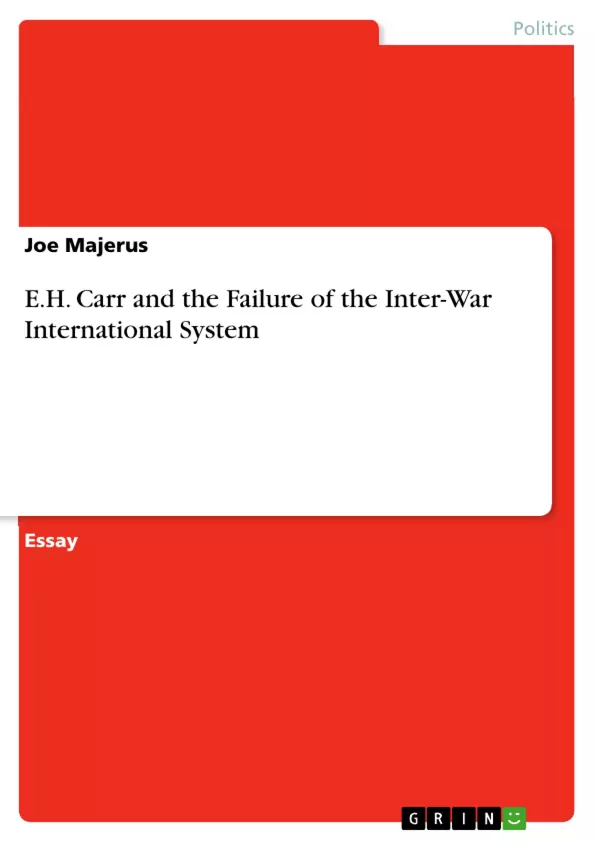Peace and international cooperation may not be sustained on a permanent basis simply by virtue of the illusory belief that states will invariably seek to preserve these ideals merely because they allegedly benefit the international community as a whole. Neither will their presumed adherence to a superior code of morality ultimately suffice on its own to protect the international order from major disruptions caused by the actions of one of its constituent sub-units.
As E.H. Carr remarked, ethical standards cannot exist independent of politics, in particular not without setting them in proper relation to the less abstract determinants in international relations, notably power. It was such a separation of power from morality which led politicians of the inter-war period to believe that international cooperation could be perpetuated solely through the establishment of institutions designed to resolve inter-state disputes within an international society whose members supposedly all shared the same goals, even though in reality they clearly didn’t.
Still, as Carr acknowledged, attempts to root moral ideals within the international order need not necessarily suffer the same fate they did in the run-up to World War II. Importantly, however, one must first become alive to the highly sensitive constellation of power and morality ultimately required to prevent the international system from giving rise to such forces as might before long prove a potential source of its own instability.
Inhaltsverzeichnis (Table of Contents)
- E.H. Carr and the Failure of the Inter-War International System
- The Limits of Moral Idealism
- The Harmony of Interests
- The Role of Power
- The Limits of International Law and Institutions
Zielsetzung und Themenschwerpunkte (Objectives and Key Themes)
This essay aims to analyze the shortcomings of the inter-war international system, drawing on the critical insights of E.H. Carr. It argues that the pursuit of moral ideals without due consideration for power dynamics ultimately contributed to the system's collapse. The essay investigates the relationship between morality and power in international relations, examining the role of institutions, the concept of harmony of interests, and the consequences of disregarding power realities.
- The Failure of the Inter-War International System
- The Relationship Between Morality and Power in International Relations
- The Limits of International Institutions and Law
- The Harmony of Interests as a Flawed Concept
- The Importance of Recognizing Power Realities in International Politics
Zusammenfassung der Kapitel (Chapter Summaries)
- The Limits of Moral Idealism: This section introduces the central argument that moral ideals alone cannot sustain international cooperation and peace. It analyzes how the separation of power from morality led to the belief that international institutions could resolve conflicts, despite differing national interests.
- The Harmony of Interests: This chapter explores the concept of the harmony of interests, arguing that it failed to recognize the inherent inequalities and conflicts of interest among nations. The essay highlights the flaws in this concept and its inadequacy in addressing the needs of dissatisfied powers.
- The Role of Power: This section focuses on the crucial role of power in international relations. It emphasizes that morality must be considered a function of power, not vice versa. The chapter argues that powerful nations often maintain the status quo at the expense of others, while less powerful nations may resort to less peaceful means to advance their interests.
- The Limits of International Law and Institutions: The essay analyzes the limitations of international law and institutions in addressing inter-state grievances. It suggests that these institutions can even contribute to conflict when national interests are not aligned. This section stresses the importance of understanding differing perceptions of morality and the constitutive nature of the international system in shaping state strategies.
Schlüsselwörter (Keywords)
The main keywords of this essay include: international relations, international order, power politics, moral idealism, harmony of interests, inter-war period, international institutions, international law, state behavior, national interests, E.H. Carr, The Twenty Years' Crisis.
Frequently Asked Questions
Why did the inter-war international system fail?
The system failed because it separated power from morality, relying on "moral idealism" while ignoring the actual power dynamics between states.
What was E.H. Carr's critique of the "Harmony of Interests"?
Carr argued it was a flawed concept that failed to recognize inherent conflicts and inequalities among nations, favoring only those who wanted to maintain the status quo.
How does power relate to morality in international relations?
Carr remarked that ethical standards cannot exist independent of politics and power; morality is often a function of power rather than vice versa.
What are the limits of international law and institutions?
They often fail because they are designed to resolve disputes within a society whose members do not actually share the same goals or interests.
What is the significance of E.H. Carr's "The Twenty Years' Crisis"?
It provides critical insights into state behavior and the constitutive nature of the international system, warning against illusory beliefs in permanent peace.
- Citar trabajo
- Joe Majerus (Autor), 2013, E.H. Carr and the Failure of the Inter-War International System, Múnich, GRIN Verlag, https://www.grin.com/document/284048



